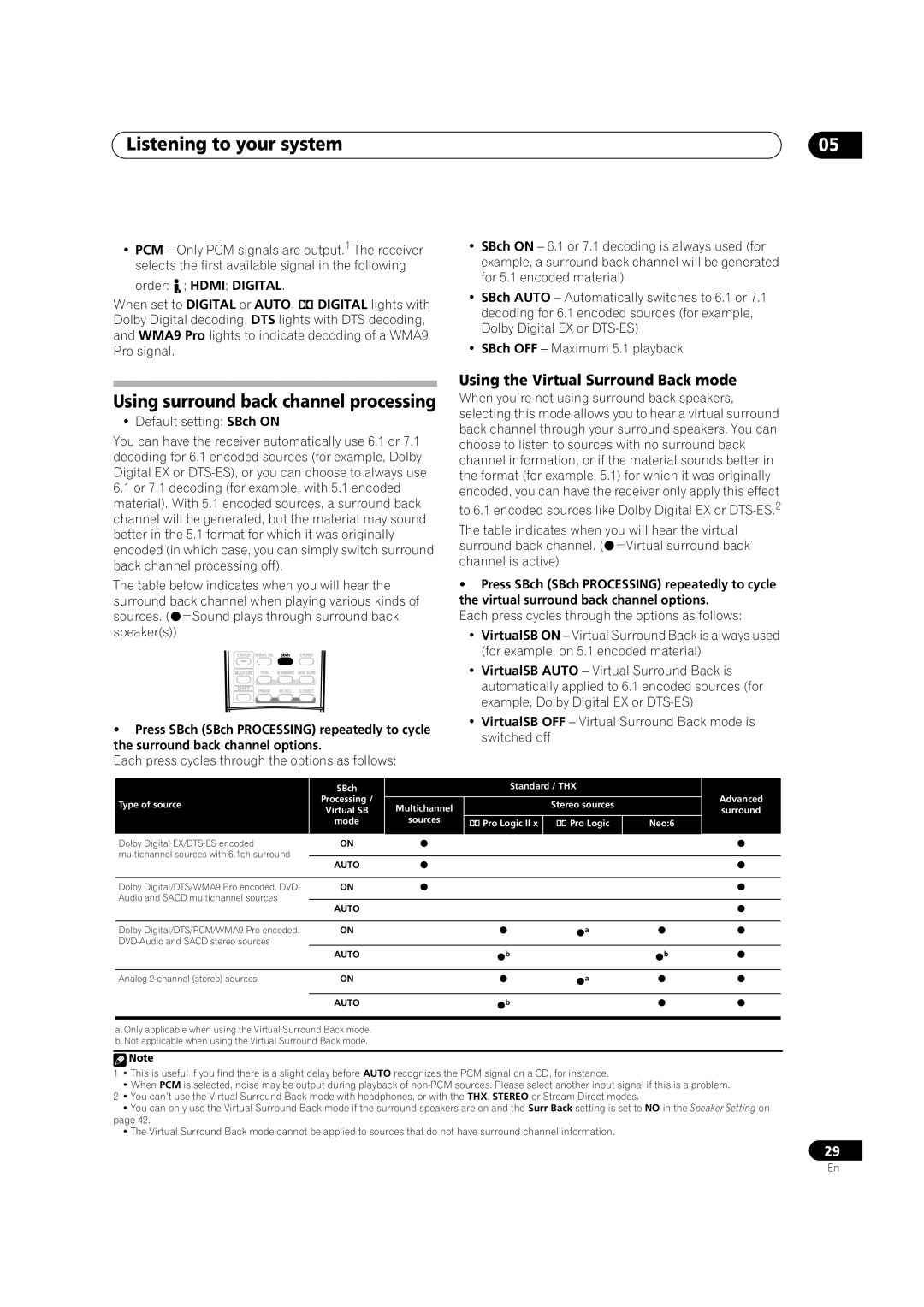
Listening to your system | 05 |
•PCM – Only PCM signals are output.1 The receiver selects the first available signal in the following
order: ![]() ; HDMI; DIGITAL.
; HDMI; DIGITAL.
When set to DIGITAL or AUTO, 2 DIGITAL lights with Dolby Digital decoding, DTS lights with DTS decoding, and WMA9 Pro lights to indicate decoding of a WMA9 Pro signal.
•SBch ON – 6.1 or 7.1 decoding is always used (for example, a surround back channel will be generated for 5.1 encoded material)
•SBch AUTO – Automatically switches to 6.1 or 7.1 decoding for 6.1 encoded sources (for example, Dolby Digital EX or
•SBch OFF – Maximum 5.1 playback
Using surround back channel processing
• Default setting: SBch ON
You can have the receiver automatically use 6.1 or 7.1 decoding for 6.1 encoded sources (for example, Dolby Digital EX or
6.1or 7.1 decoding (for example, with 5.1 encoded
material). With 5.1 encoded sources, a surround back channel will be generated, but the material may sound better in the 5.1 format for which it was originally encoded (in which case, you can simply switch surround back channel processing off).
The table below indicates when you will hear the surround back channel when playing various kinds of sources. ( =Sound plays through surround back speaker(s))
STATUS | SIGNAL SEL | SBch | STEREO |
MULTI OPE | THX | STANDARD | ADV. SURR |
SHIFT PHASE MCACC S.DIRECT
•Press SBch (SBch PROCESSING) repeatedly to cycle the surround back channel options.
Each press cycles through the options as follows:
Using the Virtual Surround Back mode
When you’re not using surround back speakers, selecting this mode allows you to hear a virtual surround back channel through your surround speakers. You can choose to listen to sources with no surround back channel information, or if the material sounds better in the format (for example, 5.1) for which it was originally encoded, you can have the receiver only apply this effect
to 6.1 encoded sources like Dolby Digital EX or
The table indicates when you will hear the virtual surround back channel. ( =Virtual surround back channel is active)
•Press SBch (SBch PROCESSING) repeatedly to cycle the virtual surround back channel options.
Each press cycles through the options as follows:
•VirtualSB ON – Virtual Surround Back is always used (for example, on 5.1 encoded material)
•VirtualSB AUTO – Virtual Surround Back is automatically applied to 6.1 encoded sources (for example, Dolby Digital EX or
•VirtualSB OFF – Virtual Surround Back mode is switched off
Type of source
SBch
Processing /
Virtual SB
mode
Standard / THX
Multichannel |
| Stereo sources |
|
|
|
| |
sources | 2 Pro Logic II x | 2 Pro Logic | Neo:6 |
| |||
|
|
|
|
Advanced surround
Dolby Digital | ON |
|
|
multichannel sources with 6.1ch surround |
|
|
|
AUTO |
|
| |
|
|
| |
|
|
|
|
Dolby Digital/DTS/WMA9 Pro encoded, DVD- | ON |
|
|
Audio and SACD multichannel sources |
|
|
|
AUTO |
|
| |
|
|
| |
|
|
|
|
Dolby Digital/DTS/PCM/WMA9 Pro encoded, | ON |
| a |
|
|
| |
| AUTO | b | b |
|
|
|
|
Analog | ON |
| a |
|
|
|
|
| AUTO | b |
|
a. Only applicable when using the Virtual Surround Back mode. b. Not applicable when using the Virtual Surround Back mode.
![]() Note
Note
1• This is useful if you find there is a slight delay before AUTO recognizes the PCM signal on a CD, for instance.
•When PCM is selected, noise may be output during playback of
2• You can’t use the Virtual Surround Back mode with headphones, or with the THX, STEREO or Stream Direct modes.
•You can only use the Virtual Surround Back mode if the surround speakers are on and the Surr Back setting is set to NO in the Speaker Setting on page 42.
•The Virtual Surround Back mode cannot be applied to sources that do not have surround channel information.
29
En
